
Cebu Pacific
Gokongwei-led conglomerate JG Summit Holdings saw a 19-percent year-on-year decline in core net profit to P4.3 billion in the first quarter as coronavirus (COVID-19) pandemic caused financial hemorrhage in its airline business while the global public health crisis likewise gnawed on its food and petrochemical business.
Including one-off items, JG Summit’s attributable net profit in the first three months plunged by 70 percent year-on-year to P1.9 billion due to hefty foreign exchange losses as well as market valuation losses on derivatives and financial assets compared to treasury gains booked in the same quarter last year.
“Coming from a strong performance in 2019, the unexpected turn of events driven by the evolving global pandemic started to have a material impact to the JG Summit group in the first quarter of 2020. This includes travel restrictions early in the year that affected our airline, Cebu Pacific, and the stricter social distancing measures mid-March has further resulted in the closure of (Robinsons Land Corp.) RLC’s malls and hotels, disruption in (Universal Robina Corp.) URC’s supply chain and delays in our petrochemical plant expansion,” JG Summit president and chief executive officer Lance Gokongwei disclosed to the Philippine Stock Exchange on Thursday.
Despite lower jet fuel prices and consumption, Cebu Pacific incurred a first quarter net loss of P1.2 billion, a reversal of the P3.36 billion net income in the same period last year, due to lower passenger volumes coupled with increase in depreciation and aircraft maintenance costs. Prior to the lockdown of Luzon in mid-March, the budget carrier had stopped flights to and from China, Hong Kong, Taipei, and Macau due to the COVID-19 outbreak.
JG Petrochemicals, on the other hand, incurred a wider net loss of P1.14 billion in the first three months compared to the P599.27 million net loss seen in the same period last year. Slow trading activity during the Luzon lockdown, when it was only operating with a skeletal workforce, dragged down revenues alongside the sluggish global market.
In the case of URC, first quarter net profit declined by 35 percent year-on-year due to high foreign exchange losses. While the branded consumer food business improved a bit in the domestic market, the offshore business was weighed down by the decline of its Indochina markets, especially in Vietnam.
Property and banking businesses, however, cushioned the impact of COVID-19 disruption on JG Summit’s first quarter results. RLC’s first quarter net profit jumped by 82 percent year-on-year to P3.34 billion as earnings contribution from the residential business soared following a recent change in accounting policy.
Robinsons Bank, for its part, chalked up P349.56 million in first quarter net profit, 721.9 percent better than the next profit year-ago.
“We are now living in an extraordinary period where lives have been heavily disrupted. In response to this situation, our group remains focused on employee health and safety, operations and supply chain continuity of our key businesses, implementing measures to manage cash, costs and liquidity, and helping the communities,” Gokongwei said.
“The situation has also driven us to review our current business and operating models to adapt to the new normal as we predict shifts in the way consumers buy/use our products and services. We are also now in the process of accelerating our digital transformation to further deliver value and improve customer experience, as well as to provide a digital workplace for our employees. With the strength of our balance sheet and the diversity of our portfolio, we expect to weather the COVID-19 situation and we hope to emerge stronger,” Gokongwei said.

